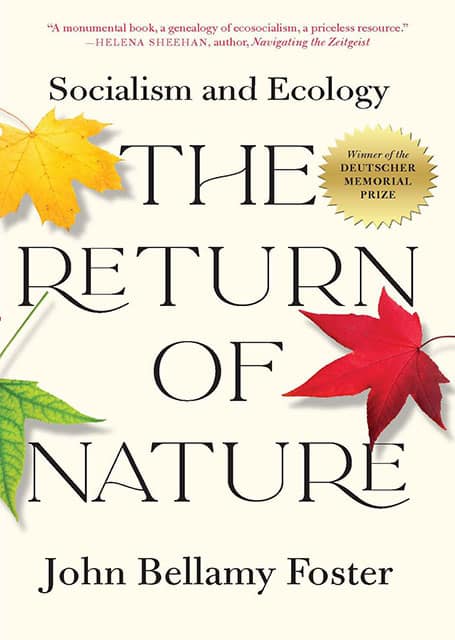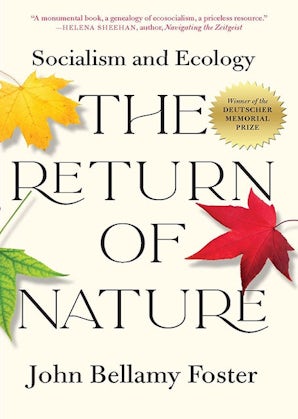“Book of the year, and the next year…and the year after that” (The Return of Nature reviewed in ‘Science and Society’)
The Return of Nature: Socialism and Ecology
by John Bellamy Foster
$35.00 / 672 pages /
Reviewed by Kaan Kangal for Science and Society
This book, by now the winner of the 2020 Deutscher Prize, was published around the time when, to paraphrase Mike Davis, “the monster entered.” The author hardly needs an introduction as most readers are familiar with the pioneering figure of the Monthly Review circle. Readers may also know, or at least agree with this reviewer, that whatever is (co-)written by Foster is massive in size, and rich and deep in content, just like this book.
When Foster wrote Marx’s Ecology twenty years ago, we experienced one of the initial “returns of nature” in our new millennium that left a blueprint on the contemporary theoretical corpus of Marxism. It became a primary reference in the ongoing debates on the “irreparable rift” between nature and society. A “return of nature” was on Foster’s agenda indeed, but his message was a little more sophisticated than “we should take nature seriously.” For a very long time, the contested issue within Marxism was whether Marxist theory has been sensitive to, or completely ignorant of, ecological crisis. Foster had argued then as he does today for a “return of nature,” but that meant returning nature to its proper place in Marxist thought, as it was originally discovered, perceived and understood by Marx and Engels. Some of us already drew a few lessons from Kohei Saito’s recent book (Karl Marx’s Ecosocialism — another Deutscher Prize winner) that there is still a great deal to learn from, and explore in, Marx’s work on ecological matters. Foster grasps the issue of ecology along the same lines, and this book is a further product of that prospect.
Unlike in Marx’s Ecology, what awaits us here is an Engels who plays the first fiddle rather than the second. Drawing on Engels’ phrase from Anti- Dühring that the “[n]ature is the proof of dialectics,” Foster formulates one key idea of the book: “ecology is the proof of dialectics” (254). This message is not only remarkably powerful but also well founded. In his The Part Played by Labour in the Transition from Ape to Man in Dialectics of Nature, Engels speaks of the irony of how human mastery over, and exploitation of, nature might end up with eroding the material circumstances of human survival. “Let us not . . . flatter ourselves,” he writes, “overmuch on account of our human conquest over nature. For each such conquest takes its revenge on us.” Engels then counts a few examples of how societies have suffered some unforeseen consequences of exploiting natural resources: destruction of forests and diminishing reservoirs of moisture when obtaining cultivable land or spreading the disease of scrofula when growing potatoes. While this is a clear-cut case for a material dialectical contradiction (something is diminished as a result of what it itself brings about), what is more to the point is that the origin of this social suffering is shown to be social rather than natural production.
Much has, of course, been said and written since Engels had spilled ink on the above lines, but our return to Engels as well as Engels’ return in our times have not always been a matter of serious concern. Part of the reason is certainly the mixed legacy of “Western Marxism” and its toxic attempt to play Marx off against Engels, charging the latter with contaminating Marxism. Foster effectively resists this tendency, rightfully I believe, to the extent that Engels is reintegrated back into the contemporary Marxist ecology. What is more is that Engels’ return coincided with a pest-like return of nature, though that is by no means a pure “natural” phenomenon: COVID-19.
Just a year ago or two, when we were alarmed by the real impacts of global warming, and by the bigotry, cynicism and ignorance of bourgeois politicians in their response to climate change, we were not aware that something more cruel was about to come. Nature made an almost demonic return, as it were. That all this coincides with Engels’ 200th birth anniversary is way too ironic. Foster’s “return of nature” and “return of Engels” attain a multiplicity of meanings in that regard.
The book is divided into three very large parts: Beyond Marx and Darwin; Engels’ Ecology; and Toward a Critical Human Ecology. Part one is largely devoted to outlining historical genealogy of the emergence of ecological materialism and eco-socialism in the intellectual journeys of the left Darwinian E. Ray Lankester and the Romantic-Marxist William Morris in relation to Marx. Foster tells us that the term “ecology,” originally coined by Ernst Haeckel in German in the 1866 work History and Creation, was first introduced into English by Lankester, Darwin’s and Thomas Huxley’s protégé, Marx’s friend and the editor of Haeckel’s book. Morris, on the other hand, seems to play a distinctive role in furnishing historical materialism in a Frankfurt- school like fashion with a strong emphasis on the powers of a revolutionary ideology of aesthetics and an aesthetics of ideology against the background of alienation of labor as well as alienation of society from nature. As Engels enters the stage in the second part of the book, we are offered a full-fledged reproduction of Engels’ theoretical undertakings and practical politics from the problems concerning the conditions of the European working classes to his systematic approaches to theoretical and applied natural sciences in relation to the legacy of Hegelian philosophy and Marxist worldview. The final part of the book is occupied with the heirs of ecosocialism since the beginning of the 20th century with Christopher Caudwell representing its point of culmination. Caudwell, a polymath in spirit as well in practice, wrote works, Foster argues, that were also ecologically informed. The distinguishing feature of Caudwell’s thought of nature and society is a philosophical mate- rialism and a dialectical theory of arts that also brought him to his personal discovery of Marxism in the midst of writing his 1937 book Illusion and Reality. Among various interesting discussions in Foster’s book, one concept significantly stands out: “Emergentist Ecological Marxism.” We have had, of course, Marxism, Ecology, Ecological Marxism and Emergentist Marxism (Sean Creaven), but not Emergentist Ecological Marxism. That there is an affiliation between Marxism, dialectical theory of nature and emergentism has been articulated by many scholars. For the Polish historian Zbigniew A. Jordan, for instance, Engels’ Anti-Dühring and Dialectics of Nature represent the core idea of emergent evolution according to which material reality consists of a multilevel structure. These levels are constituted by distinctive properties and irreducible laws, with one level emerging from temporally prior other levels. Alternatively, as the ecosocialist Ted Benton aptly puts it: nature as a whole presents a hierarchically ordered and internally differentiated unity with a continuous increase in complexity of the organization of matter. As Foster repeatedly remarks, such prominent scientists as biologists Ernst Mayr and J. B. S. Haldane, mathematician and philosopher Hyman Levy and bio- chemist Joseph Needham have all emphasized this emergentist aspect in the Marxist view of nature. The missing link, however, was, the ecological insight into the ways of how profit-oriented mechanisms of capitalist exploitation of nature are historically self-destructive and represent the origin of the “irreparable rift,” a term that applies to the ecological crisis of our time more significantly than it did to that of Marx and Engels.
Book of the year? A very bold “yes!” But it is also the book of the next year, and the year after that, and the year after that.
You can access this review at PhilPapers


